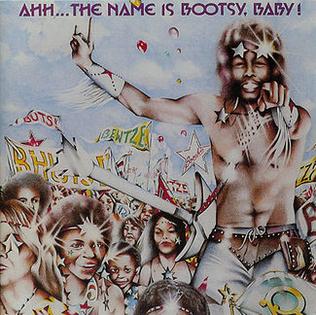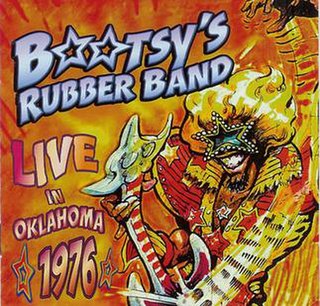Related Research Articles

Parliament-Funkadelic is an American music collective of rotating musicians headed by George Clinton, primarily consisting of the funk bands Parliament and Funkadelic, both active since the 1960s. Their eclectic style has drawn on psychedelia, outlandish fashion, and surreal humor. They released albums such as Maggot Brain (1971), Mothership Connection (1975), and One Nation Under a Groove (1978) to critical praise, and scored charting hits with singles such as "Tear the Roof Off the Sucker" (1975) and "Flash Light" (1978). Overall, the collective achieved thirteen top ten hits in the American R&B music charts between 1967 and 1983, including six number one hits. Their work would have an influential effect on subsequent funk, post-punk, hip-hop, and techno artists of the 1980s and 1990s, while their collective mythology would help pioneer Afrofuturism.

Stretchin' Out in Bootsy's Rubber Band is the first album by American funk and soul band Bootsy's Rubber Band, an offshoot act of Parliament-Funkadelic led by bassist and vocalist William "Bootsy" Collins. It was released on January 30, 1976, on Warner Bros. Records.
The Fatback Band is an American funk and disco band that was popular in the 1970s and 1980s. The Fatback Band is most known for their R&B hits: "(Do the) Spanish Hustle", "I Like Girls", "Gotta Get My Hands on Some (Money)", "Backstrokin'" and "I Found Lovin'".

The Dazz Band is an American R&B/funk band most popular in the early 1980s. Emerging from Cleveland, Ohio, the group's biggest hit songs include "Let It Whip" (1982), "Joystick" (1983), and "Let It All Blow" (1984). The name of the band is a portmanteau of the description "danceable jazz".

Graham Central Station was an American funk band named after founder Larry Graham. The name is a pun on New York City's Grand Central Terminal, often colloquially called Grand Central Station.
Deee-Lite was an American house and dance music group formed in New York City. The group's single "Groove Is in the Heart," which was released in 1990 from their debut studio album, World Clique (1990), was a top-ten hit in multiple countries. In December 2016, Billboard ranked them as the 55th most successful dance artists of all time.

Roger Troutman was an American singer, songwriter, record producer, multi-instrumentalist and the founder of the band Zapp who helped spearhead the funk movement and influenced West Coast hip hop due to the scene's heavy sampling of his music.
Dayton was a post-disco funk band, formed in Dayton, Ohio, United States by Chris Jones from the band Sun and Shawn Sandridge from Over Night Low. Derrick Armstrong (vocals), Kevin Hurt, Jenny Douglas (vocals) and Rachel Beavers (vocals) completed the line up. Former Sun member Dean Hummons played the keyboards on the first two Dayton albums.

Ahh... The Name Is Bootsy, Baby! is a funk album by Bootsy's Rubber Band, released on January 15, 1977. It reached number one on Billboard's Top R&B/Soul albums chart, the first P-Funk release to achieve this goal. The album was produced by George Clinton and William "Bootsy" Collins and arranged by Bootsy and Casper.
Con Funk Shun is an American R&B and funk band from Vallejo, California, formed in 1969. They were influenced by funk progenitors James Brown and Sly and the Family Stone. Signed to Mercury Records in 1976, the band had numerous successful national and overseas tours, eleven albums, and a number of hit singles. The group formally disbanded in 1986.
Starpoint was an American R&B and funk band from Maryland that was active from 1978 to 1990 recording 10 albums during that time. It comprised four brothers and two other musicians. The ten albums released did well, some reaching the US R&B Charts.
Gonzalez were a British R&B and funk band. They became well known as a backing band for touring R&B, funk, and soul stars. Their eponymous album was released in 1974 and they recorded a total of six albums before disbanding in 1986. They are best known for their 1979 single success with their worldwide disco hit "Haven't Stopped Dancing Yet."

"Let's Go All the Way" is a song by American musical group Sly Fox. Released as a single in 1985 from their debut studio album of the same name, the record became a sleeper hit, entering the top 10 of the singles charts in both the US and the UK the following year. Despite receiving considerable commercial and critical success, the group failed to match expectations with their later singles, and are sometimes referred to as a one-hit wonder. Original MTV veejay Martha Quinn has described "Let's Go All the Way" as "one of the funkiest songs ever".

Bootsy? Player of the Year is the third album by the American funk band Bootsy's Rubber Band. The album was released on Warner Bros. Records on January 20, 1978. At the height of the album's popularity, it competed head to head with Bootsy Collins' mentor George Clinton and his band Parliament, who had released the album Funkentelechy Vs. the Placebo Syndrome just two months earlier. The album was produced by Clinton and Collins and arranged by "The Player". The original vinyl version of the album contained a pair of cut out star shaped eyeglasses.

Funk or Walk is the debut album by the Brides of Funkenstein, released on Atlantic Records in September 1978. The album was produced by George Clinton with the exception of the album's first single "Disco To Go" which was written and produced by Clinton and Bootsy Collins. The Brides of Funkenstein consisted of Lynn Mabry and Dawn Silva, who were members of Sly and the Family Stone prior to joining P-Funk. Funk Or Walk earned Mabry and Silva a Record World Award for Best New Female Artists and Best New R&B Group in 1979. The song was originally performed live by Bootsy's Rubber Band. To this day, the P-Funk All Stars continue to play "Disco To Go" in their live concerts. The Brides of Funkenstein also toured and recorded with Parliament/Funkadelic around this same time.

This Boot Is Made for Fonk-N is the fourth album by the American funk band Bootsy's Rubber Band, released through Warner Bros. Records in 1979. Unlike previous albums by Bootsy's Rubber Band, the album did not generate any hit singles. The album was more experimental in nature than previous efforts. It would also mark the last time that the name "Bootsy's Rubber Band" would be used on a Bootsy Collins related project until the 1982 12" single release "Body Slam". This Boot Is Made for Fonk-N peaked at number 9 on the Billboard Top R&B/Hip-Hop Albums chart and number 52 on the Billboard 200 album chart.

Keepin' Dah Funk Alive 4-1995 is a live double CD set by Bootsy's New Rubber Band. The album was first released by P-Vine Records on January 25 1995, and by Rykodisc in the U.S. and the UK later that same year. The album was recorded at Club Jungle Bass in Tokyo, Japan on June 24 and 25, 1994, and represents the first live recording of Bootsy and his Rubber Band. The album includes a fold-out poster.

Funk of Ages is a solo album by former Parliament-Funkadelic keyboardist Bernie Worrell. The album was released in 1990 by Gramavision Records. It includes contributions by numerous guest musicians, including Sly and Robbie, David Byrne, Herbie Hancock, Keith Richards, Vernon Reid, and Phoebe Snow. P-Funk bandmates Bootsy Collins, Maceo Parker, Gary Cooper, Doug Duffey, and Michael Hampton also contributed.

Live in Oklahoma 1976 is a live album by the American Funk band Bootsy's Rubber Band. The album was released in 2001 and represents a collaborative effort between the Funk To The Max label, based in the Netherlands, and Bootzilla Records in the U.S.. The performance was recorded while Bootsy's Rubber Band was the support act for headliners Parliament-Funkadelic.
This is the discography of American musician Bootsy Collins.
References
- 1 2 3 Sutton, Michael. "Artist Biography". AllMusic . Retrieved February 25, 2021.
- ↑ "Troy Tipton - Bad Boy Troy". dirtyriverband.com. Retrieved January 29, 2017.
- ↑ "Greg Jackson entry". soundclick.com. Retrieved January 29, 2017.
- 1 2 Roberts, David (2006). British Hit Singles & Albums (19th ed.). London: Guinness World Records Limited. p. 508. ISBN 1-904994-10-5.
- 1 2 "Sly Fox - Awards". AllMusic. Archived from the original on November 6, 2014. Retrieved January 23, 2022.
- 1 2 3 "Sly Fox Top Songs / Chart Singles Discography". Music VF. Retrieved February 25, 2021.
- ↑ "SLY FOX - full Official Chart History". Official Charts Company . Retrieved February 25, 2021.